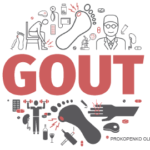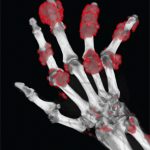PHILADELPHIA—At the first Plenary Session of ACR Convergence 2022, on Saturday, Nov. 12, speakers shared key research findings on the efficacy and safety of methotrexate as a co-therapy with pegloticase in refractory gout, the effectiveness of rituximab and cyclophosphamide in connective tissue disease associated-interstitial lung disease and the value of remote education for primary care providers in rheumatoid arthritis.
Refractory Gout
John Botson, MD, a rheumatologist in private practice in Anchorage, Alaska, reported on 12-month findings from the Methotrexate to Increase Response Rates in Patients with Uncontrolled Gout Receiving Peglogticase (MIRROR) study. Consistent with previously reported six-month findings, the new data lend greater support to adjunctive use of methotrexate as a co-therapy for patients prescribed pegloticase for refractory gout to improve both its efficacy and safety.1-3
Dr. Botson noted that patients who don’t respond well to standard, oral, uric acid-lowering agents are often very hard to treat in clinical practice. “These patients have a lot of physical disabilities; they have a lot of medical comorbidities and low quality of life and really limited treatment options,” he said.
One potential choice for such patients is pegloticase, a polyethylene glycol-conjugated (PEG) recombinant uricase approved by the U.S. Food & Drug Administration (FDA) for chronic, refractory gout.
However, Dr. Botson noted the development of anti-drug antibodies in patients often limits the use of pegloticase. “Most patients will develop [anti-drug antibodies] when [pegloticase is] given as monotherapy,” Dr. Boston said. “And these anti-drug antibodies produce a lower response rate, cause an increased risk of infusion reactions and really make it difficult for patients to complete their [treatment] course.”
MIRROR Results
Dr. Botson explained that we knew from other rheumatic diseases that concurrent treatment of methotrexate with biologic treatments does a good job of preventing the development of such anti-drug antibodies.
The double-blind, randomized, placebo-controlled MIRROR trial compared pegloticase (8 mg biweekly infusion) with placebo (n=52) and pegloticase with methotrexate (oral 15 mg/week; n =100) in patients with uncontrolled gout who had failed to improve on maximum doses of oral urate-lowering therapy.3
The trial’s primary end point was the proportion of treatment responders at month 6—defined as serum uric acid of less than 6 mg/dL for ≥80% of the time during weeks 20–24. Previously, Dr. Botson’s group had presented data demonstrating the trial met this end point, with a sustained urate-lowering response rate of 71.0% in the methotrexate group at month 6 vs. 38.5% in the placebo co-therapy group. The methotrexate group also had a lower rate of infusion reactions (4.2% vs. 30.6%).1




